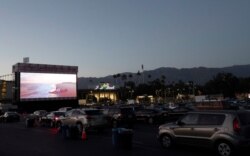Hungry for a night out of the house, people are turning to the nostalgia of drive-in movie theaters as a safe entertainment option amid coronavirus social distancing orders.
Today’s total of 305 drive-in locations is minimal compared with the more than 4,000 drive-in locations in the United States during the 1950s, but the attention they are receiving recently as a safe way to go out while practicing social distancing is something not seen in recent decades.
The 1952 Haar's Drive-In Movie Theater in Dillsburg, Pennsylvania, is one of the few original theaters that survived past the late 1980s and is the only one in York County.
Vickie Hardy took co-ownership of the family business in 2003 and opened the theater’s doors Memorial Day weekend, May 22-24, for the first time since the pandemic’s start.
The first stay-at-home orders for the area were announced in March, before the start of drive-in movie season, which gave Hardy time to prepare for business during a pandemic.
“We were following all the announcements and following the guidelines as they were announced, so we knew we would have to implement them,” Hardy told VOA. “We were getting ahead of the game. We were getting all the products we needed and getting it all set up the way it was going to be required in order for us to open up.”
Early regulations for adhering to social distancing required the drive-in to use only half of the 500-car main lot and none of the overflow lot. Movie-goers must stay within their designated space and wear a face mask if they leave their space.
“We were filled to capacity all three nights,” Hardy said. “Now keep in mind, the capacity is half what we’re accustomed to, so we did sell out. We had a lot of inquiries to continue purchasing tickets, and so I was disappointed we were not able to accommodate all that wanted to come.”
Even with the generational lull of the drive-in theater trend, Hardy wasn’t surprised to sell out on the holiday weekend, since it is their busiest time of year.
“I believe everyone is ready to do something a little different than being in their house staring at their four walls,” Hardy said. “So no, I wasn’t totally surprised.”
Pop-ups
Traditional theaters like Haar's are not the only type of drive-in growing in popularity. Pop-up theaters, true to their name, are popping up in many restaurant and venue parking lots, catering to the public’s drive to socialize.
“In order to do a drive-in theater, there’s a lot of work, there’s a lot of expense,” Hardy said. “I’m a little disappointed that pop-ups are being permitted because that is taking away from the industry that started it.”
Businesses that contribute to the pop-up theater sensation are busier than ever.
One of these is the franchise FunFlicks, which delivers and sets up inflatable drive-in movie-theater-sized screens to any location. Often for birthday parties and church or company events, these pop-up screens recently have been in high demand.
“It has surprisingly become significantly busier,” FunFlicks Mid-Atlantic General Manager Matthew Goon told VOA about early quarantine’s effect on business. “In comparison to usual, I’d say almost five times as much, just because so many people are looking to do something for the community.”
FunFlicks has a variety of screen types including drive-in movie inflatable screens at either 32, 40 or 52 feet wide. None of these sizes, however, compares to the average screen size of 52 feet tall by 120 feet wide seen at most original drive-in theaters.
Many of the events FunFlicks has set up in the past few months were not for private parties or events, but public places that wanted to use their space to host community events.
“We’re doing a ballroom … that usually is a wedding venue, but since they can’t have any weddings … they are utilizing their parking lot for the drive-in. We’ve got a lot of requests from schools to do virtual graduations and things like that,” Goon said.
“It’s a lot of community-oriented type of requests,” Goon said, such as Rotary clubs sponsoring community events for residents and local businesses.
Social distancing challenges
One of FunFlicks Mid-Atlantic’s ongoing challenges is to follow different social distancing regulations among Maryland, Philadelphia, Delaware, New Jersey and the Washington areas.
“It’s been a bit of false hope at times. We’ve gotten a ton of requests for events, but a lot of it is depending on what the individual governors say since we do operate through different states,” Goon said. “The different … mandates on social distancing are whether or not you can have bathrooms or food at these events. It’s been a lot of back and forth and waiting for someone else’s approval.”
Despite these challenges, increased demand is exciting for pop-ups such as FunFlicks and established drive-ins such as Haars. It’s difficult to predict the longevity of the drive-in movie craze, but for the first time in recent years, these businesses are being recognized on a much larger scale.
“I am very excited about the noticeability that drive-in theaters are getting now, because I always thought it was a great place to go,” Hardy said. “No matter what, you get to sit out under the stars with your family or friends and watch a movie on the biggest screen that you could have.”






